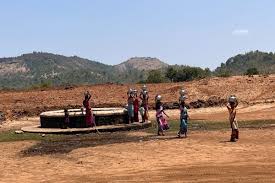As temperatures in Maharashtra’s Nandurbar district continue to soar beyond 40°C, the tribal heartland finds itself caught in an escalating water crisis that is threatening the fundamentals of daily survival.
In villages such as Dhangaon, nestled in the rugged terrain of Dhadgaon tehsil, access to clean drinking water remains a daily ordeal, exposing the widening gaps in public infrastructure and rural resilience. Residents in the region, primarily women, are forced to begin their day as early as 4 am, trekking 7 to 8 kilometres through unpaved, rocky paths to the Narmada backwaters. These routes, cut through mountainous terrain, are devoid of vehicular access, making the journey both physically exhausting and dangerous under the harsh summer sun. Those unable to reach hand pumps or water sources in time are often left empty-handed, with no recourse but to try again the following day. Water collection becomes a multi-hour task, consuming productive time and affecting the health and well-being of entire families.
Even basic household tasks like cooking, bathing, and washing utensils have become increasingly difficult. Locals ration every drop of water, often reusing it for multiple chores. Hand pumps, where available, provide only minimal supply after hours of waiting, and villagers remain uncertain whether the water is fit for consumption. While official complaints have been lodged, villagers allege that the response from authorities has been absent or dismissive, leaving the issue unaddressed year after year.
The tribal-dominated regions of Nandurbar have long remained on the fringes of development. Despite ambitious government schemes promising potable water and sustainable infrastructure, the region appears to have been overlooked. Several clusters, comprising over 200 villages, claim that they have yet to see the benefits of basic state-sponsored amenities. With summer heat intensifying and the India Meteorological Department forecasting consistent highs over 40°C in the coming weeks, the urgency for intervention has never been greater.
This ongoing crisis not only reflects infrastructural deficiencies but also points towards broader systemic neglect of India’s tribal populations. The disproportionate burden on women, who are primarily responsible for water collection, raises serious concerns about gender equity and social justice in climate-vulnerable zones. In an era where water access is increasingly intertwined with health outcomes and economic productivity, the continued marginalisation of such communities undermines the nation’s sustainable development goals.
As the sweltering summer advances and reservoirs remain distant dreams for many, these villages are calling not for sympathy but for sustainable solutions. The need for decentralised water systems, solar-powered pumps, rainwater harvesting structures, and robust last-mile delivery mechanisms cannot be overstated. Unless urgent action is taken, the parched cries of these communities will only grow louder, echoing through the dry valleys of Maharashtra’s most neglected terrains.
Also Read :https://urbanacres.in/delhi-sees-higher-temperatures-with-imd-predicting-light-rain-and-gusty-winds/


